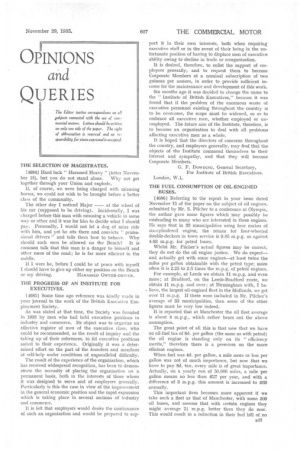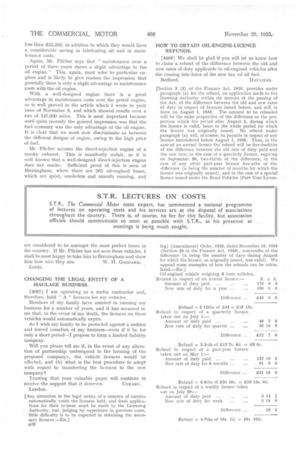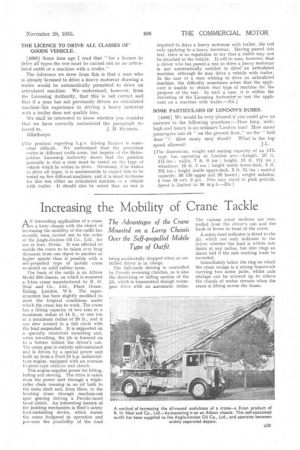OPINIONS and QUERIES
Page 51

Page 52

Page 53

If you've noticed an error in this article please click here to report it so we can fix it.
THE SELECTION OF MAGISTRATES.
(4084J Hard hick " Harassed Heavy" (letter November 15), but you do not stand alone. Why not get together through your Union and explode.
If, of course, we were being charged with misusing horses, we could not wish to be brought before a better class of the community.
The other day I noticed Major — at the wheel of his car (supposed to be driving). Incidentally, I was charged before this man with misusing a vehicle in some way or other and it was for him to decide what I should pay. Personally, I would not let a dog of mine ride with him, and yet he sits there and convicts "professional drivers" and tells them how to behave. Why should such men be allowed on the Bench? It is common talk that this man is a danger to himself and other users of the road; he is far more efficient in the saddle.
If I were he, before I could be at peace with myself I should have to give up either my position on the Bench
or my driving. HARASSED OWNER-DRIVER.
THE PROGRESS OF AN INSTITUTE FOR EXECUTIVES.
(46851 Some time ago reference was kindly made in your journal to the work of the British Executive Employment Society.
As was stated at that time, the Society was founded in 1933 by men who had held executive positions in industry and commerce. Its object was to organize an effective register of men of the executive class, who could be recommended, as the result of inquiry and the taking up of their references, to fill executive positions suited to their experience. Originally it was a determined effort on the part of the founders and members at self-help under conditions of unparalleled difficulty.
The result of the experience of the organization, which has received widespread recognition, has been to demonstrate the necessity of placing the organization on a permanent basis, both in the interests ot those whom it was designed to serve and of employers generally. Particularly is this the case in view of the improvement in the general economic position and the rapid expansion which is taking place in several sections of industry and commerce.
it is felt that employers would desire the continuance of such an organization and would be prepared to sup
port it in their own interests, both when requiring executive staff or in the event of their being in the unfortunate position of having to displace men of executive ability owing to decline in trade or reorganization.
It is desired, therefore, to enlist the support of employers generally, and to request :them to become Corporate Members at a nominal subscription of two guineas per annum, in order to provide sufficient income for the maintenance and development of this work.
Six months ago it was decided to change the name to the "institute of British Executives," because it was found that if the problem of the enormous waste of executive personnel existing throughout the country is to be overcome, the scope must be widened, so as to embrace all executive men, whether employed or unemployed. The future aim of the Institute, therefore, is to become an organization to deal with all problems affecting executive men as a whole.
It is hoped that the directors of concerns throughout the country, and employers generally, may find that the objects of the Institute commend themselves to their interest and sympathy, and that they will become Corporate Members.
G. F. DOWDING, General Secretary, For Institute of British Executives. London, W.1.
THE FUEL CONSUMPTION OF OIL-ENGINED BUSES.
[4086] Referring to the report in your issue dated November 15 of the paper on the subject of oil engines, submitted by Mr. S. Pilclier to a conference at Olympia, the author gave some figures which may possibly he misleading to many who are interested in these engines. He says that in 33 municipalities using four makes of six-cylindered engine, the return for four-wheeled double-deckers in town service is 9.05 m.p.g. as against 4.93 m.p.g. for petrol buses.
Whilst Mr. Pilcher's actual figures may be correct, they do not do the oil engine justice. We do expect— and actually get with some engines—at least twice the miles per gallon obtainable with the petrol type; more often it is 2.25 to 2.5 times the m.p.g. of petrol engines.
For example, at Leeds we obtain 11 m.p.g. and even more ; at Bradford, on the Leeds-Bradford route, we obtain 11 m.p.g. and over ; at Birmingham with, I believe, the largest oil-engined fleet in the Midlands, we get over 11 m.p.g. If these were included in Mr. Pilcher's average of 33 municipalities, then some of the other figures must be very low indeed.
It is reported that at Manchester the oil fleet average is about 8 m.p.g., which rather bears out the above assumption.
The great point of all this is that new that we have an oil-fuel tax of 8d. per gallon (the same as with petrol) the oil engine is standing only on its "efficiency merits," therefore there is a premium on the more efficient engines.
When fuel was 4d. per gallon, a mile more or less per gallon was not of much importance, but now that we have to pay 8d. tax, every mile is of great importance. Actually, on a yearly run of 50,000 miles, a mile per gallon means no less than £27 per year, and with a difference of 3 m.p.g. this amount is increased to £69 annually.
This important item becomes more apparent if we take such a fleet as that of Manchester, with some 300 oil buses, and assume that with certain engines they might average 21 m.p.g. better than they do now. This would result in a reduction in their fuel bill of no less than £22,200, in addition to which they would have a considerable saving in lubricating oil and in maintenance costs.
Again, Mr. Filcher says that "maintenance over a period of three years shows a slight advantage to the oil engine." This, again, must refer to particular engines and is likely to give readers the impression that generally there is only a slight advantage in maintenance • costs with the oil engine.
With a well-designed engine there is a great advantage in maintenance costs over the petrol engine, as is well proved in the article which I wrote in your issue of November 8, and which showed results over a run of 145,000 miles. This is most important because until quite recently the general impression was that the fuel economy was the only advantage of the oil engine. It is clear that we must now discriminate as between the different designs of engine, owing to the high price of fuel.
Mr. Filcher accuses the direct-injection engine of a smoky exhaust. This is manifestly unfair, as it is well known that a well-designed direct-injection engine does not smoke. Sufficient proof of this is seen at Birmingham, where there are 265 oil-engined buses, which are quiet, smokeless and smooth running, and are considered to be amongst the most perfect buses in the country. If Mr. Filcher has not seen these vehicles, I shall be most happy to take him to Birmingham and show
him how nice they are. W. H. GODDARD. Leeds,
CHANGING THE LEGAL ENTITY OF A HAULAGE BUSINESS.
f46871 I am operating as a motor contractor and, therefore, hold ". A " licences for my vehicles.
Members of my family have assisted in running my business for a number of years, and it has occurred to me that, in the event of my death, the licences on these vehicles would automatically expire.
As I wish my family to be protected against a sudden and forced cessation of my business—even if it be for only a short period—I propose to form a limited liability company.
Will you please tell me if, in the event of any alteration of partnership (subsequent to the forming of the proposed company), the vehicle licences would be affected; and (b) what is the best procedure to adopt with regard to transferring the licences to the new company?
Trusting that your valuable paper will continue to
receive the support that it deserves. UNEASY. London.
[Any alteration in the legal entity of a concern of carriers automatically voids the lice-tides held, and fresh applications for their re-issue must be made to the Licensing Authority, but, judging by experience in previous cases,
. little difficulty is to be expected in obtaining the necessary licences.—En.] B33 HOW TO OBTAIN OIL-ENGINE-LICENCE REFUNDS.
[4688] We shall be glad if you will let us know how to claim a refund of the difference between the old and new rates of duty applicable to oil-engined vehicles after the coming into force of the new tax on oil fuel.
Bedford. HAULIERS.
[Section 3 (3) of the Finance Act, 1935, provides under paragraph (a) for the refund, on application made to the licensing authority within six months of the passing of the Act, of the difference between the old and new rates of duty in respect of licences issued before, and still in force on August 1, 1935. The amount to be refunded will he the same proportion of the difference as the proportion which the period after August 1, during which the licence is valid, bears to the whole period for which the licence was originally issued. No refund under paragraph (a) will, of course, be payable in respect of any licence surrendered before August 1, 1935. Thus, in the case Ig an annual licence the refund will be five-twelfths of the difference between the old rate of duty paid and the new rate; in the case of a quarterly licence, expiring on September 30, two-thirds of the difference; in the case of any other part-year licence five-xths of the difference (x being the number of months for which the licence was originally issued), and in the case of a special licence issued under the Road Vehicles (Part Year Licens
ing) (Amendment) Order, 1933, dated November 15, 1933 (Section 26 of the Finance Act, 1935), x-seveuths of the difference (x being the number of days during August for which the licence, as originally issued, was valid). We append some examples of how the refunds call be calculated.—ED.1 Oil-engined vehicle weighing 8 tons unladen.
Refund in respect of an annual licence:—
THE LICENCE TO DRIVE ALL CLASSES OF GOODS VEHICLE. , [4689] Some time ago I read that "for a licence to drive all types the test must be carried out on an articulated outfit or .a machine with a trailer."
The inference we drew from this is that a man who is already licensed to drive a heavy motorcar drawing a trailer would be automatically permitted to drive an articulated machine. We understand, however, from the Licensing Authority, that this is not correct and that if a man has not previously driven an articulated machine-his experience in driving a heavy motorcar with a trailer does not qualify him.
We shall be interested to know whether you consider that we have correctly understood the paragraph re ferred to. J. B. HUDSON. Miliathorpe.
ITEie position regarding h.g.v. driving licences is somewhat difficult. We understand that the procedure varies in different traffic areas, but inquiry of the Metropolitan Licensing Authority shows that the position generally is that man must be tested on the type of vehicle which he wishes to drive. Obviously, if he wishes to drive all types, it is unreasonable to expect him to be tested on five different machines, and it is usual to choose for this test either an articulated machine or a vehicle with trailer. It should also be noted that no test is required to drive a heavy motorcar with trailer, the test only applying to a heavy motorcar. Having passed this test, there is no regulation to say that a trailer may not be attached to the vehicle. It will be seen, however, that a driver who has passed a test to drive a heavy motorcar is not automatically entitled to drives an articulated machine, although he may drive a vehicle with trailer. In the case of a man wishing to drive an articulated machine, the difficulty sometimes arises that the applicant is unable to obtain that type of machine for the purpose of the test. In such a case, it is within the discretion of the Licensing Authority, to test the applicant on a machine with trailer.—ED.]
SOME PARTICULARS OF LONDON'S BUSES.
[4690] We would be very pleased if you could give us answers to the following questions.:—How long, wide, high and heavy is an Ordinary London bits? How many
• passengers can sit " on the ground Boor," on the " first floor "? How many may stand? What is the top speed allowed? J
[The dimensions, weight and seating capacity of an STL type bus operating in London are :—Length, 25 ft. lift ins:; width, 7 ft. 6 ins. ; height, 13 It. 11 ins.; wheelbase, 16 ft. 3 ins. ; height inside lower-deck, lq ins.; height inside upper-deck, 5 ft. 8* ins.; seating capacity, 56 (30 upper and 26 lower) ; weight unladen, 5 tons 18 cwt. 2 qrs. Five may stand at peak periods.
Speed is limited to 30 m.p.h.—En.]




























































































